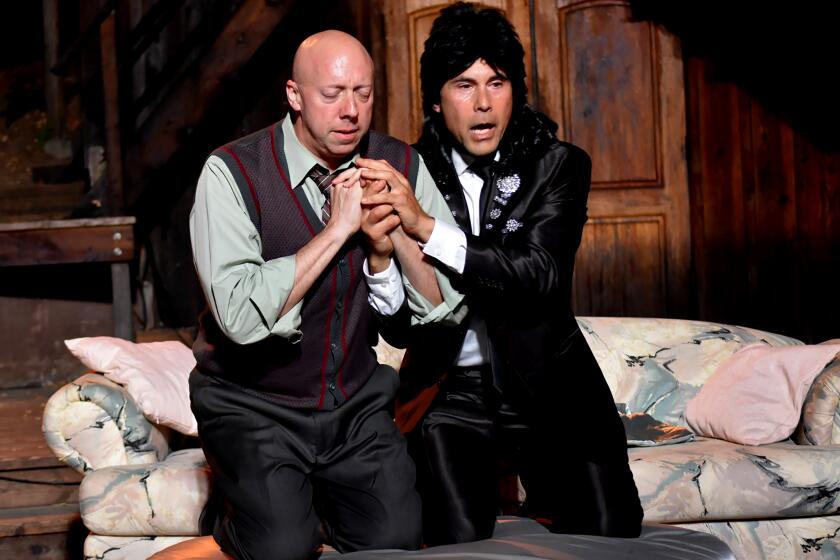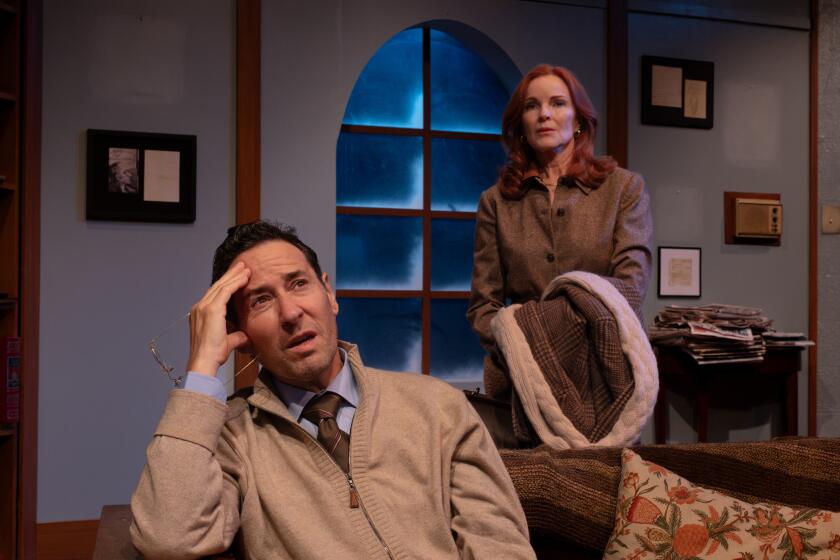BLOMSTEDT IN S.F. : A DIFFERENT CONDUCTOR ‘AT HOME’
Poet or pedant. That isn’t an overture. It is a lingering, vexing question.
For years, Herbert Blomstedt has been conducting the Los Angeles Philharmonic, both at the Music Center and at the Hollywood Bowl. His presence on our podia always was essentially reassuring. It wasn’t always exciting.
Blomstedt, it seemed, was a solid, old-fashioned professional. Nothing went seriously wrong when he was around, and nothing went dramatically right.
He impressed as a strong technician, a tasteful analyst and a rather bland, sometimes ponderous interpreter. He seemed to possess the brains of a schoolmaster and the temperament of a banker.
When our orchestra was searching for a successor to Carlo Maria Giulini, nobody seemed to give the American-born, Swedish-trained maestro from Dresden serious consideration.
But when San Francisco found itself in need of a successor to Edo de Waart, Blomstedt obviously was the right man at the right place at the right time. Now savoring his first full season as the 10th music director of the San Francisco Symphony, he has become almost everyone’s hero at 59.
The local press treats him, for the most part, with resonable awe. Local audiences shower him with instant ovations. The musicians respond to his sane, gentlemanly urgings with respect, maybe even enthusiasm. The public-relations geniuses have managed to suggest, ever so subtly, that he represents the second coming of Bruno Walter, with a little Toscanini and Furtwaengler thrown in for good measure.
An enlightened routinier in Los Angeles, he has become the object of reverence in San Francisco. How come?
The explanations must be complex. They may involve subtle chemistry. It is perfectly possible that the somber Blomstedt personality inspires more sympathy with one conglomerate of musicians than another.
The explanations may involve such delicate matters as acoustics and cultural conditioning. The Dorothy Chandler Pavilion certainly isn’t Davies Symphony Hall, and Los Angeles certainly isn’t San Francisco.
The differences also could relate to rehearsal time, to psychological influences, or to the simple fact that orchestras often play better for their boss than they are apt to play for just another guest passing briefly through town.
Be all that as it may, the San Francisco Blomstedt isn’t taken for granted. This season he conducts eight weeks of subscription concerts plus a Beethoven Festival and a national tour. Next season, the orchestra’s 75th, he will lead 11 of 26 subscription programs in addition to seven weeks devoted to special concerts, festivals and a European tour.
In a city not noted for musical adventure, he has even dared announce an ambitious series of premieres and celebrations of the avant-garde. His plans look brave, relatively unorthodox, interesting.
And, if one may judge by a single, possibly atypical concert, his conducting here reflects degrees of flair and finesse that one could hardly take for granted in Los Angeles.
Wednesday night, he opened a nicely balanced program with the prelude to Wagner’s “Lohengrin.” The strings shimmered gently and, despite a slow tempo, tensions never sagged.
In Beethoven’s Fourth Piano Concerto, Blomstedt did his considerable best to sustain nobility and propulsion despite the rather pedestrian solo performance of Claudio Arrau--a distinguished veteran obviously not in top form.
Nielsen’s heroic Symphony No. 4 (“The Inextinguishable”) had been performed by the San Franciscans only once before, and that was back in 1970 under Jean Martinon. A champion of the neglected Danish romanticist, Blomstedt unraveled the lush convolutions with uncommon breadth and lyricism, even with flamboyance where needed.
The orchestra encountered a few pitch problems under pressure, but played with pervasive sweep and bravado. Although the audience shrank drastically after Arrau’s final bow, those who stayed cheered--with good reason.
Yes. Under the right conditions, the pedant can be a poet.
More to Read
The biggest entertainment stories
Get our big stories about Hollywood, film, television, music, arts, culture and more right in your inbox as soon as they publish.
You may occasionally receive promotional content from the Los Angeles Times.






